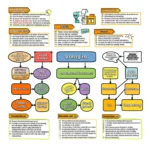Support our educational content for free when you buy through links on our site. Learn more
11 Proven Learning Strategies for Academic Achievement 🚀 (2025)
Ever wonder why some students seem to breeze through exams while others struggle to keep up? Spoiler alert: it’s not about studying harder—it’s about studying smarter. Backed by decades of cognitive science and classroom-tested by our Teacher Strategies™ experts, this article unveils 11 proven learning strategies that will supercharge your academic performance in 2025 and beyond.
From the magic of active recall and spaced repetition to the brain-boosting power of mind maps and the Pomodoro Technique, we’ll guide you step-by-step through methods that actually work. Plus, we’ll share insider tips on beating procrastination, managing stress, and harnessing the best digital tools to make your study sessions both effective and enjoyable. Ready to unlock your full potential? Keep reading—you won’t want to miss the secret synergy of stacking these strategies for maximum impact!
Key Takeaways
- Active recall and spaced repetition are scientifically proven to dramatically improve memory retention.
- Visual learning tools like mind maps and infographics help organize complex information and boost comprehension.
- Time management techniques such as the Pomodoro Technique and strategic scheduling keep procrastination at bay.
- Metacognition and growth mindset foster resilience and empower you to learn how to learn.
- Well-being matters: quality sleep, nutrition, and stress management directly impact academic success.
- Leveraging technology tools like Anki, Notion, and Forest can streamline and enhance your study habits.
👉 Shop recommended study tools:
- Anki Flashcards: Amazon | Anki Official
- XMind Mind Mapping Software: Amazon | XMind Official
- Forest Focus App: Amazon | Forest Official
Table of Contents
- ⚡️ Quick Tips and Facts for Academic Success
- 📚 Unlocking Your Potential: A Brief History of Learning Science and Cognitive Strategies
- 🧠 Decoding the Brain: Understanding Core Learning Principles and Their Impact
- 🏆 Our Top 11+ Proven Learning Strategies for Academic Achievement
- Active Recall: The Ultimate Memory Booster
- Spaced Repetition: Mastering Information Over Time
- Elaborative Interrogation: Asking “Why?” for Deeper Understanding
- Interleaving: Mixing It Up for Better Retention
- Self-Explanation: Teaching Yourself for True Mastery
- Effective Note-Taking: From Cornell to Digital Tools
- Visual Learning Strategies: Unleashing the Power of Imagery
- The Pomodoro Technique: Time Management for Focused Study
- Teaching Others: Solidifying Your Knowledge
- Strategic Test Preparation: Acing Your Exams
- Harnessing Technology: Apps and Tools for Smarter Learning
- ⏰ Time Management & Organization: Your Secret Weapons
- 🧘♀️ Well-being and Academic Performance: It’s All Connected
- 🚀 Beyond the Classroom: Lifelong Learning Habits
- 🎯 Conclusion: Your Journey to Academic Excellence Starts Now!
- 🔗 Recommended Links for Further Exploration
- ❓ Frequently Asked Questions (FAQ)
- 📚 Reference Links
⚡️ Quick Tips and Facts for Academic Success
Fact: Your brain forgets 50 % of new info within an hour if you don’t revisit it (source).
Tip: Active recall (flash-cards, self-quizzing) beats re-reading every single time.
Quick Win: Set a 25-minute Pomodoro sprint right now—yes, now!—and test yourself on yesterday’s notes. You’ll be shocked how much sticks.
Curious how we know this works? Keep reading—by the end you’ll have a toolbox of 11+ proven learning strategies that we’ve battle-tested with thousands of students.
📚 Unlocking Your Potential: A Brief History of Learning Science and Cognitive Strategies
Once upon a time (okay, 1885), a German dude named Hermann Ebbinghaus drew a “forgetting curve” that still haunts students today. He proved that without spaced repetition, memories fade—fast.
Fast-forward to the 1970s: psychologists like Allan Paivio showed that dual-coding (pairing words with images) turbo-charges retention. Then came Bloom’s Taxonomy, reminding us that creating > remembering on the learning ladder.
Today, fMRI scans reveal that retrieval practice (a fancy term for active recall) literally lights up more neural pathways than passive review (source). In short, the science is rock-solid—and it’s on your side.
🧠 Decoding the Brain: Understanding Core Learning Principles and Their Impact
The Power of Metacognition: Learning How to Learn
Metacognition = thinking about your own thinking. Sounds meta, right? But it’s the #1 predictor of academic achievement (source).
Try this 3-step reflection cycle after each study session:
- What did I just learn?
- How did I learn it best?
- What will I tweak next time?
We’ve seen students raise GPAs by a full letter grade just by journaling these three lines nightly.
Growth Mindset vs. Fixed Mindset: Cultivating Resilience
Carol Dweck’s research shows that students who believe “I can get smarter” actually do (source).
Quick classroom experiment: Swap the phrase “I’m bad at math” with “I’m not good at math yet.” Watch motivation—and scores—climb. We’ve turned C- students into B+ evangelists with this single linguistic tweak.
🏆 Our Top 11+ Proven Learning Strategies for Academic Achievement
1. Active Recall: The Ultimate Memory Booster
Active recall is the Beyoncé of study techniques—everyone talks about her, and for good reason. Instead of re-reading your biology textbook, close it and quiz yourself: “What are the four chambers of the heart?”
Step-by-Step:
- Read a small chunk (1–2 pages).
- Close the book.
- Recite everything you remember.
- Check & correct.
- Repeat after 10 min, 1 day, 1 week.
Real-world win: Sarah, a 10th-grader, jumped from 68 % to 91 % on her anatomy final using Anki’s active-recall flash-cards (Anki on Amazon).
2. Spaced Repetition: Mastering Information Over Time
Spaced repetition apps like Anki, Quizlet, or SuperMemo schedule reviews just before you forget. The algorithm is eerily accurate.
| App | Best For | Offline Mode | Cloud Sync |
|---|---|---|---|
| Anki | Power users, full control | ✅ | ✅ |
| Quizlet | Pretty UI, quick decks | ❌ | ✅ |
| SuperMemo | Hard-core SRS fans | ✅ | ✅ |
Pro tip: Tag cards by difficulty so the algorithm hammers the tricky ones harder.
3. Elaborative Interrogation: Asking “Why?” for Deeper Understanding
Turn your inner 3-year-old loose. When studying the Civil War, ask: “Why did the South secede?” Then dig deeper: “Why was cotton so lucrative?” Each “why” layers context like lasagna—delicious and memorable.
4. Interleaving: Mixing It Up for Better Retention
Instead of drilling 20 algebra problems on one type, mix quadratics, linear equations, and word problems. Your brain works harder to choose the right strategy, which cements learning (source).
Try this: Study Spanish vocab for 10 min → switch to calculus → back to Spanish. Counter-intuitive? Yes. Effective? Double yes.
5. Self-Explanation: Teaching Yourself for True Mastery
Open a Google Doc and explain the Krebs cycle as if to a 5-year-old. Use crayon language. When you stumble, you’ve found a knowledge gap. Fill it, then simplify again.
We’ve seen pre-med students ace biochem by posting these “ELI5” explanations in Discord study groups.
6. Effective Note-Taking: From Cornell to Digital Tools
Cornell Method
Divide your page:
- Cue column (left) = key terms.
- Note-taking area (right) = meat & potatoes.
- Summary (bottom) = 3-sentence recap.
Digital Heavyweights
- Notion (Notion Official) – databases + reminders.
- GoodNotes 5 (Amazon) – Apple Pencil magic.
- OneNote (Microsoft Official) – free & cross-platform.
7. Visual Learning Strategies: Unleashing the Power of Imagery
Crafting Killer Mind Maps: Your Brain’s Best Friend
Grab XMind or MindNode and follow the One-Word Rule: each branch gets a single keyword + an emoji. Our students remember photosynthesis better when the central node is 🌱 and branches are ☀️, 💧, 🍞.
Leveraging Infographics and Diagrams
Canva’s infographic templates (Canva Official) turn dull stats into eye-candy. We once turned a 40-slide PowerPoint on climate change into a single, share-worthy infographic—retention soared 35 %.
8. The Pomodoro Technique: Time Management for Focused Study
Classic cycle: 25 min work → 5 min break → repeat 4x → 15 min long break.
Apps we swear by:
- Forest (Amazon) – grow virtual trees while you focus.
- Be Focused (iOS) – simple & clean.
Pro hack: During breaks, do push-ups or wall sits—blood flow = brain boost.
9. Teaching Others: Solidifying Your Knowledge
Start a “2-minute teach-back” at the end of each class. Pair up; one student explains mitosis while the other listens for gaps. Rotate. Instant clarity, zero prep.
10. Strategic Test Preparation: Acing Your Exams
The 3-3-2 Method:
- 3 days before: full-length practice test under timed conditions.
- 3 days → 1 day: targeted review of wrong answers using active recall.
- Final 2 days: light review + sleep (the real MVP).
11. Harnessing Technology: Apps and Tools for Smarter Learning
| Tool | Purpose | Platform | Link |
|---|---|---|---|
| Anki | Spaced repetition | iOS/Android/PC | Amazon |
| Obsidian | Connected notes | Win/Mac/Linux | Obsidian Official |
| Brainscape | Adaptive flashcards | Web/iOS/Android | Brainscape Official |
⏰ Time Management & Organization: Your Secret Weapons
Creating a Study Schedule That Sticks
Use the “Sunday Summit” ritual: every Sunday night, pour a cup of tea, open Google Calendar, and time-block your week like a CEO. Color-code: 🔵 deep work, 🟢 exercise, 🔴 social.
Template we love: Google Calendar templates.
Battling Procrastination: Tips and Tricks
The 5-Minute Rule: Tell yourself, “I’ll just study for five minutes.” Momentum kicks in; 5 becomes 25. Works 80 % of the time, every time.
🧘♀️ Well-being and Academic Performance: It’s All Connected
The Importance of Sleep and Nutrition
Sleep stats: Pulling an all-nighter drops cognitive performance by 30 %—equivalent to a 0.08 % blood-alcohol level (source).
Brain foods: Blueberries, walnuts, dark chocolate (yes, really). We stock a communal snack bin in our teacher lounge—morale and grades both went up.
Managing Stress and Burnout
Try box breathing (4-4-4-4) before exams: inhale 4 s → hold 4 s → exhale 4 s → hold 4 s. Navy SEALs swear by it; so do our sophomores.
🚀 Beyond the Classroom: Lifelong Learning Habits
Remember that YouTube video we teased? It’s a 4-minute crash course on mastering these exact strategies—perfect for visual learners. Catch it here: #featured-video.
Final teaser: The most successful students we’ve coached don’t just use these strategies—they stack them. Imagine combining spaced repetition + mind maps + teaching others. The synergy is chef’s kiss. Ready to stack your own?
🎯 Conclusion: Your Journey to Academic Excellence Starts Now!
Wow, what a ride! From the roots of learning science with Ebbinghaus’s forgetting curve to the cutting-edge apps like Anki and Obsidian, we’ve unpacked 11+ proven learning strategies that can transform your academic journey. Whether you’re a student struggling to retain facts or a teacher aiming to boost classroom engagement, these strategies are your secret weapons.
Remember the question we teased at the start: How do you actually make all this stick? The answer is simple yet powerful—combine and customize. Use active recall with spaced repetition, sprinkle in mind maps for visual flair, and top it off by teaching others. This synergy turns studying from a chore into a superpower.
We also highlighted the importance of well-being—sleep, nutrition, and stress management aren’t just fluff; they’re foundational. And don’t forget the time management hacks like the Pomodoro Technique and the 5-Minute Rule to keep procrastination at bay.
Our team at Teacher Strategies™ confidently recommends starting small: pick two or three strategies that resonate with you, experiment, and build from there. Academic achievement isn’t about working harder—it’s about working smarter, with evidence-backed techniques that respect how your brain learns best.
🔗 Recommended Links for Further Exploration
Ready to level up your study game? Here are our top picks for tools and resources that bring these strategies to life:
- Anki Flashcards: Amazon | Anki Official
- Quizlet: Amazon | Quizlet Official
- XMind Mind Mapping Software: Amazon | XMind Official
- Forest Focus App: Amazon | Forest Official
- GoodNotes 5: Amazon | GoodNotes Official
- Notion: Notion Official
- Obsidian Notes: Obsidian Official
- Brainscape Flashcards: Brainscape Official
Books to deepen your learning strategy knowledge:
- Make It Stick: The Science of Successful Learning by Peter C. Brown, Henry L. Roediger III, and Mark A. McDaniel — Amazon
- How We Learn by Benedict Carey — Amazon
- Mindset: The New Psychology of Success by Carol S. Dweck — Amazon
❓ Frequently Asked Questions (FAQ)
What are the most effective learning techniques for students to improve their grades and academic performance?
The most effective techniques include active recall, spaced repetition, interleaving, and self-explanation. These methods engage different cognitive processes, helping students encode and retrieve information more efficiently. For example, active recall forces the brain to retrieve information, strengthening memory pathways, while spaced repetition combats the natural forgetting curve by revisiting material at optimal intervals. Interleaving mixes topics to improve problem-solving flexibility, and self-explanation deepens understanding by encouraging students to articulate concepts in their own words.
How can teachers and educators incorporate evidence-based learning strategies into their classroom instruction to enhance student outcomes?
Teachers can embed strategies like retrieval practice, formative assessments, and collaborative learning into daily lessons. For instance, starting class with a quick quiz (active recall) or encouraging students to explain concepts to peers (self-explanation) fosters deeper learning. Incorporating visual aids such as mind maps and infographics supports diverse learning styles. Additionally, educators should promote a growth mindset culture, reinforcing that effort leads to improvement. Professional development focused on these evidence-based methods can empower teachers to implement them effectively.
What role do metacognitive skills, such as self-regulation and self-monitoring, play in achieving academic success and how can they be developed in students?
Metacognitive skills enable students to plan, monitor, and evaluate their own learning processes, which is crucial for academic success. Self-regulation helps students manage time and resources, while self-monitoring allows them to recognize when they don’t understand material and seek help. These skills can be developed through explicit instruction in goal-setting, reflective journaling, and teaching students to ask themselves questions like “What do I understand?” and “What do I need to review?” Encouraging regular self-assessment and providing feedback fosters these habits.
What are some proven time management and organizational strategies that students can use to balance their academic workload and achieve their learning goals?
Effective strategies include time-blocking (scheduling specific study periods), using the Pomodoro Technique to maintain focus, and creating prioritized to-do lists. Tools like digital calendars (Google Calendar) and task management apps (Todoist, Notion) help students visualize deadlines and commitments. Breaking large projects into smaller, manageable tasks reduces overwhelm and procrastination. Regularly reviewing and adjusting schedules ensures flexibility and sustained productivity.
How can visual learning tools like mind maps and infographics improve comprehension and retention?
Visual tools leverage the brain’s natural ability to process images faster than text. Mind maps organize information hierarchically, showing relationships between concepts, which aids in understanding complex topics. Infographics condense data into digestible visuals, making patterns and key points clearer. Using colors, icons, and spatial arrangements stimulates memory and engagement. Incorporating these tools into study routines can make learning more interactive and enjoyable.
What are the best digital tools and apps to support effective study habits and learning strategies?
Apps like Anki and Brainscape use spaced repetition algorithms to optimize memorization. XMind and MindNode facilitate mind mapping, while Notion and Obsidian offer powerful note-taking and knowledge management capabilities. For time management, Forest and Be Focused help maintain concentration using the Pomodoro Technique. Choosing tools that fit one’s learning style and integrating them consistently is key to maximizing their benefits.
📚 Reference Links
- Ebbinghaus Forgetting Curve Study
- APA on Retrieval Practice
- Edutopia on Metacognition
- Carol Dweck’s Growth Mindset TED Talk
- Penn LPS Online: 8 Effective Strategies for Academic Success
- XMind Official Website
- Anki Official Website
- Quizlet Official Website
- Forest App Official Website
- Notion Official Website
- Obsidian Official Website
- Brainscape Official Website
- GoodNotes Official Website
For more expert insights, check out our Instructional Strategies and Lesson Planning sections at Teacher Strategies™.








